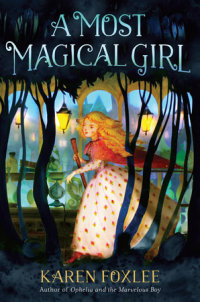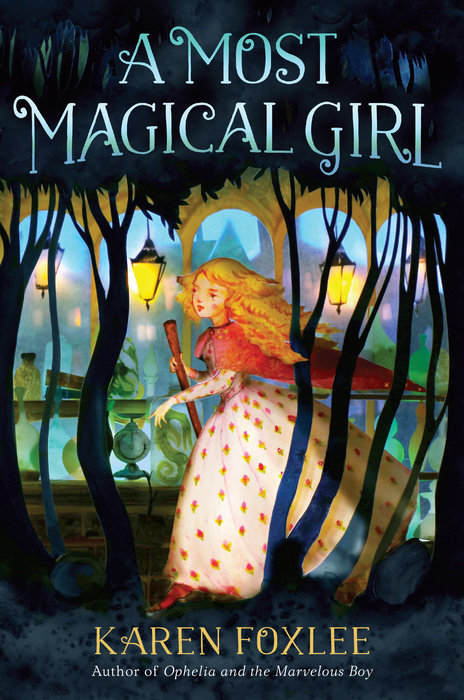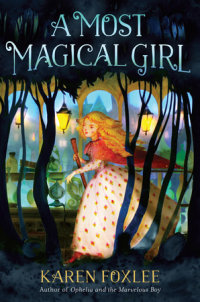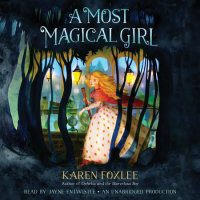A Most Magical Girl
From the author of Ophelia and the Marvelous Boy comes the story of a friendship between two girls set in Victorian England, with magical machines, wizards, witches, a mysterious underworld, and a race against time.
Annabel Grey is primed for a proper life as a young lady in Victorian England. But when her mother suddenly disappears, she’s put in the care of two eccentric aunts who thrust her into a decidedly un-ladylike life, full of potions and flying broomsticks and wizards who eat nothing but crackers. Magic, indeed! Who ever heard of such a thing?
Before Annabel can assess the most ladylike way to respond to her current predicament, she is swept up in an urgent quest. Annabel is pitted against another young witch, Kitty, to rescue the sacred Moreover Wand from the dangerous underworld that exists beneath London. The two girls outsmart trolls, find passage through a wall of faerie bones, and narrowly escape a dragon, but it doesn’t take long for Annabel to see that the most dangerous part of her journey is her decision to trust this wild, magical girl.
Sparkling with Karen Foxlee’s enchanting writing, this is a bewitching tale of one important wand and two most magical girls.
"[Foxlee's] heroines have grit and heart, and they are willing to get dirty. And they do. Foxlee’s nicely wry tone and moments of incongruous humor break up the tension, while Annabel’s race against time in a harrowing journey deep under London keeps the pages turning. Deliciously complex and convincingly detailed."--Kirkus Reviews, Starred Review
"Kids who enjoyed Foxlee’s Ophelia and the Marvelous Boy and fans of Hardinge’s Cuckoo Song will find similar otherworldly appeal in this enthralling adventure."--The Bulletin, Starred review
"Memorable for its vivid imagery and stylish, thoughtful prose."--Horn Book Magazine
An Excerpt fromA Most Magical Girl
1
“A young lady should find, in all manner of circumstances and predicaments, a way to be both cheerful and content.”
--Miss Finch’s Little Blue Book (1855)
Annabel Grey arrived late in the afternoon in her best dress and her new red town cloak. She stepped down from the carriage and surveyed the street with her chin held high. She smiled. She smiled the way she had been taught to smile when things were terrible or even just a little bad. She smiled as though she’d just seen something lovely. A beautiful painting, perhaps, or a butterfly.
It was exactly the sort of street she had imagined, although she had never once been to this side of London. It was a mean street, the buildings leaning, holding each other up like a mouthful of rotten teeth. It was a stinking, wet place. There were cattle being herded across intersections, and stone buildings and churches and factories streaming black smoke, all crammed side by side. It was a damp and dark street, choked with wagons and carriages and filled with foul weather. A temperamental wind stamped up and down the road, slamming doors and stealing umbrellas and tugging at her bonnet ribbon.
She concentrated very hard on not letting her smile falter.
The costermongers were cowering under eaves, calling out, “Hot cooked eels” and “Pickled whelks,” above the sound of the wind. The shop signs read usurer and milliner and haberdasher. ship broker and grain broker and silver broker. falconer and feather purveyor and supplier of fine tartan. But before her was a shop with the words misses e. & h. vine’s magic shop neatly printed on the glass. And opening the door was a tall, straight woman with a scowl on her face.
“Annabel Grey?” said the woman.
“Yes,” said Annabel Grey.
The tall, straight woman wore a dark dress buttoned up to her chin. Her hair was black and in no way matched her face, which was very old--long and thin and crosshatched with grooves.
The tall, straight woman did not smile. “I am Miss Henrietta Vine.”
“My great-aunt!” cried Annabel, and she thought perhaps she should throw herself at the woman’s feet, but Miss Henrietta Vine did not look as if she would tolerate such a thing.
There was nothing welcoming about Henrietta Vine.
“ ‘Miss Henrietta’ will do,” she said sharply. “And you are nearly thirteen?”
“On Friday I will be thirteen,” said Annabel.
“You are small for your age, then,” the woman said. “And too young in my opinion to have had your skirts let down.”
Miss Henrietta had grave blue eyes, and her expression was solemn, as though she were about to tell Annabel something terrible, something much more terrible than what had already happened. The terrible-news gaze was unwavering, and it made Annabel look away. She looked at her feet, at the footpath, at the shop glass behind Miss Henrietta.
“So, here you are,” said Miss Henrietta. “Your mother has finally done what is proper.”
Just the mention of her mother made Annabel sway.
It was her mother who had sent her here. Her mother, who had suddenly needed to go abroad. Annabel felt the smile slipping from her mouth, and she fought very hard to keep it in its place. Tears threatened to spill from her eyes.
Miss Henrietta Vine did nothing to comfort her. “You have a secret,” she said, looking at Annabel carefully. “You have a secret you try to keep from the world.”
“No, I don’t,” said Annabel. She was so shocked by these words that the tears completely dried up.
The wind blew against their skirts and it began to rain. Miss Henrietta told the driver where to take Annabel’s trunk, then raised her dark eyebrows and motioned for Annabel to follow her inside.
“This is not an ordinary magic shop,” said Miss Henrietta Vine when they were inside. She looked at Annabel sternly, daring her to disagree. Annabel dared not. It was most definitely a magic shop, and it was crowded with the most unusual things Annabel had ever seen. There was a long counter cluttered with greasy jars and bottles. Some contained greenish liquids; in others, things floated that she did not wish to see. There was a long gray stick, with words carved faintly all over it, beside a dog-eared ledger.
The shop smelled peculiar. It was pepperminty and medicinal and sweet and sour in equal parts. It smelled wrong, and Annabel took a handkerchief from her sleeve and held it to her nose, but Miss Henrietta frowned so fiercely that she quickly put it away. She breathed through her mouth and smiled as pleasantly as she could. Miss Henrietta glowered in return.
Behind the counter were two large specimen cabinets with many small drawers, some of them open and some of them shut. What looked like black feathers spilled from one and blue ribbons from another, and gray brittle twigs spewed in a tangle from a third. There were shelves behind the cabinets that reached high up the walls to where a dark clock ticked angrily, as though every second were an insult to itself. The shelves were crammed with books and hats and boxes and feathers and leaves and large sticks and more jars and more wooden boxes and, on the very top shelf, several large stones.
“No, this is not an ordinary magic shop,” repeated Miss Henrietta, looking at Annabel’s open mouth with disapproval. Her long black skirt made a dreadful swishing noise on the marble floor. A dark brooch glittered on her chest. Her hand reached out to the gray stick on the counter. “This is the Ondona, our wand, the Vine Witches’ Wand. We do not keep any of the newer types of wands. You will meet customers inquiring after such things. They rush past to catch a late train and see the word magic and think they will buy tricks for their children. We trade only in high-end items that come upon the market rarely. Why, we have traveled twice to New York to purchase important wands from important witches who were about to die. These are old wands, passed down through generations. We also hold a small amount of seeing glass, most of it for the Finsbury Wizards, which must be delivered to their door, for they do not travel nowadays. They send their requests via pigeon.”
Annabel closed her mouth. She tried very hard to be polite.
“In this cabinet there are some important ingredients that you will soon accustom yourself with. The drawers are alphabetically listed, as you will see--dandelion, devil’s claw, dogwort--and you may in time learn to retrieve things that we ask for.”
Annabel felt dizzy. Miss Henrietta Vine used the term we, but there was no one else present in the messy shop. Miss E. Vine’s absence made her nervous. And surely she wasn’t expected to work here, was she? Her mother had told her she was coming to continue her education.
She was a young lady.
“Your mother has sent you here to learn what you should have commenced learning long ago,” said Miss Henrietta, as if she could hear Annabel’s thoughts. “Your life has been but an illusion. Your mother has lied terribly. The sea-captain husband lost at sea? All deceit. She turned her back on us years ago, on magic--good magic, proper magic.”
“But my father was a sea captain,” said Annabel.
“Nonsense,” replied Miss Henrietta. “Your mother married a magician without our consent. A magician--yes, cheap tricks in halls--and with her so divinely magical. It was a great shock, and Estella never quite got out of bed again. Then one day while your mother was very heavy with you, why, he up and died.”
Annabel felt even dizzier. Her mother had always said that her father was a sea captain. That he had been lost at sea. She swayed where she stood.
“He was hit by a carriage, dear Annabel, on the Euston Road,” said Miss Henrietta. “And that was not even the worst of it. But sit down if you must. There, now, don’t look so shocked.”
Annabel stumbled toward the counter and the stool behind it. Miss Henrietta looked most displeased.
“We will teach you the working of the shop, Annabel Grey, for we are old. We are all old in the Great & Benevolent Magical Society. The Bloomsbury Witches are ancient. They once rode their broomsticks each night, delivering love magic. The Kentish Town Wizards have such rheumatism that they can hardly stand up. I send salves each week to Miss Broughton, the Witch of St. John’s Wood. Once, she could heal almost anything that was sick, much like your mother--children, especially, and birds you would think could never fly again--but she does not improve. Yes, we will teach you what we can of the shop, and then, if you show promise, of magic.”
Miss Henrietta paused for a long moment. The clock on the wall ticked indignantly.
“This is what is expected of you now, although I have my doubts. I fear your mother has left all too late. You are a girl without education. A girl from a long line of witches, of good pedigree, but with no talent. It is most disappointing.”
Annabel’s cheeks itched and burned.
“But I’ve been to Miss Finch’s Academy for Young Ladies,” said Annabel. “I’ve been for two years. I speak French and Latin--well, I’m not very good at Latin, but I received honors for geography.”
She had. She knew each and every European river and was very good at mapping them. The Rhine, the Seine, the Danube, the Arno. All the mountains: The Swiss Alps and the Pyrenees. The Vogelsbergs and the Carpathians. Isabelle Rutherford, Annabel’s closest friend, said Annabel was the best in the whole world at knowing mountain ranges. Nevertheless, if it was possible, Miss Henrietta looked even more disappointed.
“Your mother told us that you see things, you have visions,” said Miss Henrietta. Annabel’s breath caught, but Miss Henrietta held up her hand to stop her from talking. “Do you feel an affinity with an animal: the fox, the owl, the cat, the bird? Please close your mouth, girl.”
Annabel could make no sense of it. Affinity with an owl? She quite liked Charlie, her bullfinch, who sang in their little sunny parlor. Just the thought of it and she felt homesick again.
“I am to believe your mother taught you no magic,” said Miss Henrietta.
Annabel’s mother and magic did not seem right in the same sentence. Her mother had belonged to the Society of Philanthropic Sea Widows. She had met with the Ladies’ Lepidoptera Club each and every Saturday. She was beautiful and graceful and most unmagical.
Annabel decided she would swoon. She would swoon, and it would serve Miss Henrietta right for being so horrible. She sat very still on the stool and willed herself to faint, but couldn’t. Miss Henrietta sighed. “Here is Kitty,” she said. “I hope she has brought what I need.”
The bell above the door tinkled, and the wildest girl Annabel had ever seen entered from the rain. Her head was held low, a furious frown upon her face, and there was not an inch of tidiness to her. Her wet black curls were tied roughly with a piece of twine, and a brown leaf dangled on a strand beside her ear. Her filthy dress was too short, and her stockings were full of holes, and her wet boots were split apart at the toes and tied around with string.
“Good evening, Kitty,” said Miss Henrietta. “You are late, and I am busy.”
The girl grunted in response. She flung her sack down on the floor. She stared at Annabel from beneath her dark brow with green eyes. The stare made Annabel blush and look away. She looked at the sack. At the counter. At the clock. The girl coughed a terrible, hacking cough. When Annabel looked again, the girl was still staring, and it made Annabel’s face burn all the more.
“Annabel, this is Kitty. Kitty, this is Annabel,” said Miss Henrietta, as though it were perfectly reasonable for a young lady to be introduced to a beggar.
The old woman took the sack and emptied its contents onto the counter: shells that clattered out, stinking of the Thames; a bundle of grass; several plump leaves; and the perfect body of a dead little rabbit.
Annabel gasped. “Oh,” she said when Miss Henrietta and the girl glared at her. “Please pardon.”
“The leaves are good,” said Miss Henrietta. “From the dean’s garden again? He has a fine garden, does he not?”
The girl nodded but did not speak.
“What of the world today, then, Kitty?” asked Miss Henrietta. “Bring us news.”
Still the wild girl did not speak. Her cheeks colored. Her eyes grew glassy, and she scowled at the floor. Miss Henrietta waited.
“All the trees are in a fuss,” said Kitty quietly at last. She seemed to struggle with each word, yet her voice surprised Annabel. It was not a proper girl’s voice, but it was soft all the same. Soft and clear. “Calling, calling, calling all night through the streets. Something bad is coming, and the moon getting as big as it’s ever been seen.”
“So the wizards keep saying. Message after message. Calamity approaching,” said Miss Henrietta. “It’s a wonder their pigeons don’t fall clean out of the sky with all their coming and going.”
Annabel thought a little smile flickered across the wild girl’s lips, but she couldn’t be sure because already the girl was turning from them. She was grabbing her sack and running as though speaking had shamed her. Miss Henrietta went behind her and slipped a small parcel into her hand as she went. The girl did not say thank you. She ran from the shop, banging the door behind her.
Miss Henrietta took a deep breath when the girl was gone. She looked at Annabel with her disappointed face.
“The day is nearly done, Annabel,” she said. “Hang your cloak and your gloves and bonnet. There is laundry to be done.”
Laundry, thought Annabel as she stood up and walked slowly to the hat stand. It seemed the most puzzling suggestion so far. She wanted to stay thinking about the strange girl. Who was she, and where had she come from, and what did she mean about trees calling? Annabel was hungry, too; Henrietta Vine had not even offered her tea.
“A witch’s dresses can be washed only at dusk on Wednesday,” said Miss Henrietta. “And today is Wednesday, and it is dusk.”
Miss Henrietta held up both her arms. She pointed to two large dark doors on either side of the specimen cabinets.
“On no account must you ever open the door on the left,” she said. “Unless it is asked of you. Do you understand?”
“Yes, Miss Henrietta,” said Annabel.



